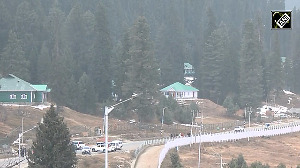Abdul Qadeer Khan, father of Pakistan's atomic bomb who was behind a worldwide black market in nuclear technology, has sent potentially incriminating documents outside the country through his daughter as a safeguard against legal action against him, a leading London daily reported on Sunday.
The documents and a tape-recorded statement, which are said to demonstrate that senior Pakistani army officials, including President Gen Pervez Musharraf, were aware of Khan's nuclear proliferation activities, are believed to have been smuggled out of the country by Dina, The Sunday Telegraph claimed in London.
| |||||||||||
They believe that his daughter is prepared to disclose their contents if legal action is brought against him by the country's military government.
The 68-year-old metallurgist, who is under house arrest, faces 24-hour surveillance for the rest of his life, Pakistani officials told the daily.
The pardon granted to Khan was conditional. "It is not a blanket pardon. It relates only to his television confession," Massoud Khan, Pakistan's Foreign Office spokesman told the newspaper.
The pardon was granted on the grounds that Khan 'had co-operated with the investigation begun by the government in November 2003 and that he will continue to co-operate'. It would not extend to any activities that may be revealed as the probe into Khan's actions continues.
"What we have ensured is that he and his network of associates would never again be able to operate. They have effectively been demolished," the spokesman said.
"The government has been trying to retrieve the documents since Khan was offered a presidential pardon last week but they are yet to receive them, even though he promised," one official said.
The official said the government had decided to negotiate a deal with Khan only after it found out that his daughter had left Pakistan with the potentially incriminating material.
| |||||||||||
According to the report, the discovery derailed plans to put Khan and a number of his associates, on trial over their role.
In January, three senior government officials, including the head of the Pakistan's intelligence agency, Inter Services Intelligence, held meetings with Khan in which they convinced him to apologise unconditionally and surrender the documents in return for a pardon. But Khan apparently did not surrender the documents.
"The government's concern was genuine," said one intelligence official. "First because they were unaware of the exact nature and details of these documents, and second, because of Khan's knowledge of all the secret nuclear dealings.
"If his daughter reveals this secret information, it could create problems both for the country and its nuclear programme," he said.





